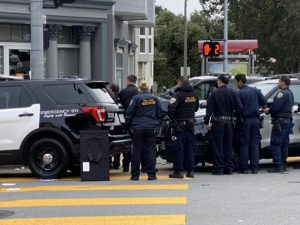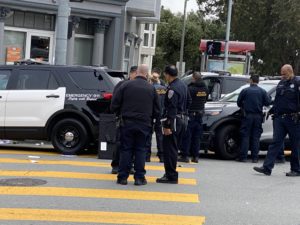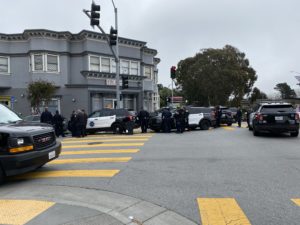
The usual morning rush hour crush in Glen Park village was further complicated around 8:30 am Thursday morning due to an incident at the Dignity Health Urgent Care clinic at the northeast corner of Diamond and Bosworth streets. A man, apparently in a mental health crisis, drew an extraordinary—for Glen Park—response from SFPD.
According to Rhonda Cash, Glen Park’s highly valued street crossing guard for schoolchildren on their way to neighborhood schools, who was right there at the scene, the man was sitting in the doorway of the clinic. He had spread the belongings of his backpack over the sidewalk and was acting erratically. A passerby spoke to Rhonda, became concerned and called 911 from the BART plaza.
The man was apparently in possession of a knife which threatened the safety of the public and himself.
What followed was a major police response in which the streets between Diamond from Wilder to Bosworth Street were cordoned off, impacting commuters trying to get to work. Buses were diverted to other neighborhood streets. BART was concerned due to proximity of the incident to the Glen Park station.
In addition to usual resources, police were supplemented by at least two hostage negotiators who were there to use their specialized verbal techniques to get the man to comply peacefully. After around a three-hour standoff, the incident was resolved.

Rachel Moran, commander of the field operations bureau of the Golden Gate division of SFPD, was on scene to oversee the operation, but deferred to the expertise of the incident commander, Ingleside Captain Derrick Lew. Lew is new to the Ingleside and was formerly with a violent crime unit; he has extensive experience with such situations. (Note: Captain Lew will be a guest speaker at the quarterly meeting of the Glen Park Association on Zoom at 7:00 pm,Thursday, April 21. Go to the sidebar of www.glenparkassociation.org to register to attend.)
Moran said times have changed in handling such incidents since 2016 when the Collaborative Reform Initiative went into effect due to criticism of a series of high-profile officer-involved shootings. Whereas before police would be quicker to rush in and grab a suspect experiencing a mental illness episode, “Now we just talk to people. We’re making sure they feel comfortable until they surrender. We slow everything down. We have time on our side. It’s inconvenient for the neighborhood and the local businesses and traffic, but we just want everybody to be safe.”

Nevertheless, it still might seem to a casual observer that the police response in terms of numbers of officers and vehicles is overwhelming and unwarranted. Moran explained the variety of roles requiring special expertise in handling such situations so that everyone stays safe.
“Have you ever fought with somebody? When you’re trying to take them into custody you’re trying not to hurt them or have them hurt you.” You need hostage negotiators, officers and vehicles trying to keep the suspect contained to keep them from taking off and necessitating reestablishing another containment area. Some officers have beanbag shotguns, others have pepper spray. There are also several supervisors making sure that their people are doing the right thing.
An officer was called in from the Mission to hold down a corner so people wouldn’t breach the area. Officers from other districts were also called in to assist so that the Ingleside could handle other more routine service calls.
This is a good use of personnel because, says Moran, “Hopefully this won’t be a violent ending. Whether he’s under the influence or whether he has a weapon or not, he’s in crisis and he needs help.”
By 11:30 am the man was taken away by ambulance for treatment.